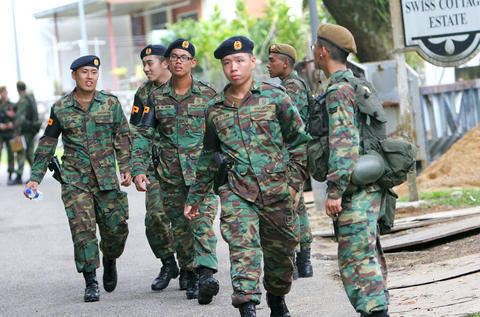Singapore, which prides itself on rigorous anti-terrorist measures, yesterday blamed a security lapse for the escape of an alleged leader of the Jemaah Islamiyah (JI) militant network.
Authorities mounted a massive manhunt as analysts said Mas Selamat bin Kastari, accused of planning to hijack a plane and crash it into Changi Airport, would try to flee to Indonesia.
"This should never have happened. I'm sorry that it has," Home Affairs Minister Wong Kan Seng (

PHOTO: EPA
Rohan Gunaratna, head of the International Center for Political Violence and Terrorism Research, said Kastari had escaped once when he was in Indonesia, but his flight from the Singapore facility was unexpected.
"I think that it has surprised the Singapore authorities and everyone because Singapore's security systems are world-class," he said.
The ministry said Kastari walks with a limp and was not known to be armed.
It said he escaped on Wednesday afternoon from the Whitley Road Detention Center, which holds prisoners detained by the Internal Security Department.
Wong said Kastari had been taken from his cell to the family visit room to await his family.
"He asked to go to the toilet, where he escaped," Wong said.
The minister was responding to a member of parliament who said the escape "raised concerns about our police force vigilance and security operating procedures."
Wong said security had been tightened at all air, sea and land checkpoints and no effort would be spared to locate Kastari, who analysts say received military training in Afghanistan.
Soldiers, Special Operations police and paramilitary Nepalese Gurkhas had joined the manhunt.
Clive Williams, a professor with the Australian Defence Force Academy, predicted Kastari would try to reach Indonesia, "because if he stays in Singapore he's going to be arrested fairly quickly I would think."
Kastari, born in 1961, was arrested on the Indonesian island of Bintan near Singapore in 2003 and sentenced by a court there to 18 months in jail.
He was later released but arrested again by Indonesian authorities in January 2006 before being handed over to Singapore.
Kastari had fled Singapore in December 2001 following an Internal Security Department operation against JI, the Home Affairs ministry said previously.
"He was among those who had planned retaliation against Singapore for arresting and detaining his fellow JI members. He had planned to hijack a plane and crash it into Changi Airport," the ministry said.
Singapore authorities arrested 15 people in December 2001 -- 13 of whom were suspected JI members -- who allegedly planned to attack a bus carrying Americans to a subway station.
Businesses, offices and schools operated normally despite the massive security presence.
Wong said security agencies had concluded there was "no imminent danger" to the public after Kastari's escape.
He said an independent investigation was being conducted into the incident.

A French-Algerian man went on trial in France on Monday for burning to death his wife in 2021, a case that shocked the public and sparked heavy criticism of police for failing to take adequate measures to protect her. Mounir Boutaa, now 48, stalked his Algerian-born wife Chahinez Daoud following their separation, and even bought a van he parked outside her house near Bordeaux in southwestern France, which he used to watch her without being detected. On May 4, 2021, he attacked her in the street, shot her in both legs, poured gasoline on her and set her on fire. A neighbor hearing

DEATH CONSTANTLY LOOMING: Decades of detention took a major toll on Iwao Hakamada’s mental health, his lawyers describing him as ‘living in a world of fantasy’ A Japanese man wrongly convicted of murder who was the world’s longest-serving death row inmate has been awarded US$1.44 million in compensation, an official said yesterday. The payout represents ¥12,500 (US$83) for each day of the more than four decades that Iwao Hakamada spent in detention, most of it on death row when each day could have been his last. It is a record for compensation of this kind, Japanese media said. The former boxer, now 89, was exonerated last year of a 1966 quadruple murder after a tireless campaign by his sister and others. The case sparked scrutiny of the justice system in

DITCH TACTICS: Kenyan officers were on their way to rescue Haitian police stuck in a ditch suspected to have been deliberately dug by Haitian gang members A Kenyan policeman deployed in Haiti has gone missing after violent gangs attacked a group of officers on a rescue mission, a UN-backed multinational security mission said in a statement yesterday. The Kenyan officers on Tuesday were on their way to rescue Haitian police stuck in a ditch “suspected to have been deliberately dug by gangs,” the statement said, adding that “specialized teams have been deployed” to search for the missing officer. Local media outlets in Haiti reported that the officer had been killed and videos of a lifeless man clothed in Kenyan uniform were shared on social media. Gang violence has left

US Vice President J.D. Vance on Friday accused Denmark of not having done enough to protect Greenland, when he visited the strategically placed and resource-rich Danish territory coveted by US President Donald Trump. Vance made his comment during a trip to the Pituffik Space Base in northwestern Greenland, a visit viewed by Copenhagen and Nuuk as a provocation. “Our message to Denmark is very simple: You have not done a good job by the people of Greenland,” Vance told a news conference. “You have under-invested in the people of Greenland, and you have under-invested in the security architecture of this